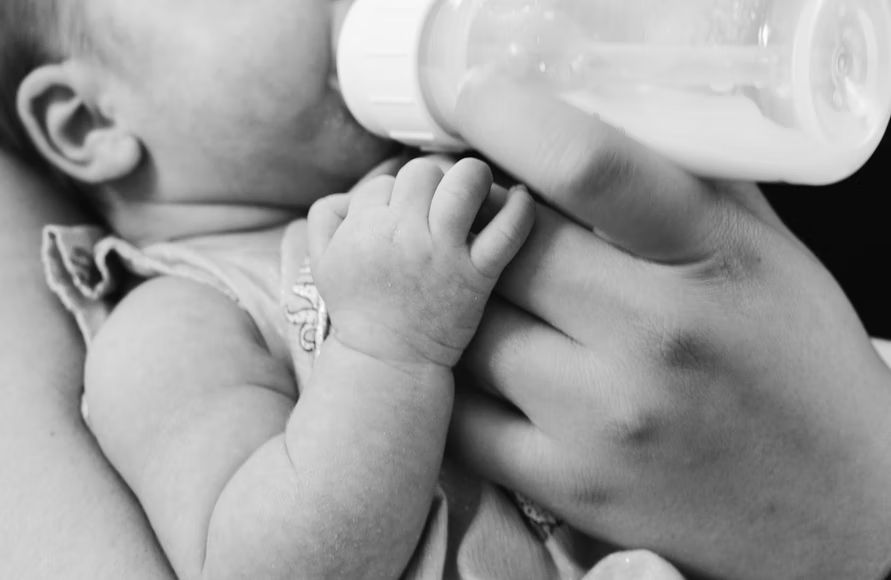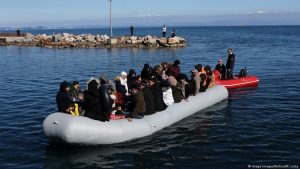A military plane carrying enough specialty infant formula for more than 500,000 baby bottles arrived in Indianapolis on Sunday, the first of several flights from Europe expected to relieve a shortage that has parents scrambling to find enough to feed their children.
Because no commercial flights were available, President Joe Biden authorised the use of Air Force planes for the effort, dubbed “Operation Fly Formula.”
Also read: Infants hospitalised in South Carolina due to baby formula shortage
White House press secretary Karine Jean-Pierre told reporters aboard Air Force One as Biden travelled from South Korea to Japan that the formula flown in was worth 78,000 pounds (35,380 kilograms).
Agriculture Secretary Tom Vilsack was on hand in Indianapolis to meet the first shipment.
The flights are meant to provide “some incremental relief in the coming days” while the government works on a more long-term solution to the shortfall, according to Brian Deese, director of the White House National Economic Council.
Deese told CNN that the flight on Sunday provided 15% of the specialist medical grade formula needed in the US, and that due to various government efforts, Americans should see “more formula in stores starting as early as this week.”
Also read: A Korean War-era law is fighting US’ baby formula crisis
Longer term, he believes the United States requires more formula providers “so that no individual company has this much control over supply chains.”
The Biden administration has struggled to solve the widespread scarcity of infant formula, particularly hypoallergenic versions. The situation follows the February closure of the nation’s largest domestic manufacturing plant in Michigan owing to safety concerns.
According to the White House, 132 pallets of Nestle Health Science Alfamino Infant and Alfamino Junior formula were scheduled to depart Ramstein Air Base in Germany for the United States.
In the coming days, another 114 pallets of Gerber Good Start Extensive HA formula were planned to arrive. Approximately 1.5 million 8-ounce bottles of the three hypoallergenic formulas for youngsters with cow’s milk protein sensitivities are slated to arrive this week.
Also read: Americans banned from Russia: Updated ‘black list’ includes Biden, actor Morgan Freeman
Indianapolis was designated as a Nestle distribution centre. According to an administration official on-site, the formula will be loaded into FedEx semitractor-trailers and transported to a Nestle distribution centre about a mile away, where the company will perform a standard quality control check before distributing the supplies to hospitals, pharmacies, and doctor’s offices.
Nestle stated that it has been working “around the clock” for the past few months to fix the formula deficit and meet demand.
“We have significantly increased the amount of our formulas available to consumers by ramping up production and accelerating general product availability to retailers and online, as well as through hospitals and home health care for those most vulnerable,” the company said in a statement.
“At Nestle we are absolutely committed to doing everything we can to get parents and caregivers the formula they need so their children can thrive,” the statement added. “We prioritised these products because they serve a critical medical purpose as they are for children with cow’s milk protein allergies.”
According to the USDA, under “Operation Fly Formula,” the Departments of Agriculture and Health and Human Services are authorised to request Department of Defense assistance to pick up overseas infant formula that fulfils US health and safety standards, allowing it to reach store shelves faster.
Also read: ‘Everybody should be concerned about’ monkeypox, warns Biden as cases rise
Alfamino is generally provided through hospitals and home health care agencies that provide services to patients at their homes.
US regulators and the maker, Abbott Nutrition, intend to restart its Michigan plant next week, but product delivery will take roughly two months.
The Food and Drug Administration reduced importation criteria for infant formula this week in an effort to alleviate a supply shortage that has left store shelves devoid of some brands and some merchants restricting supply for parents concerned about feeding their children.






